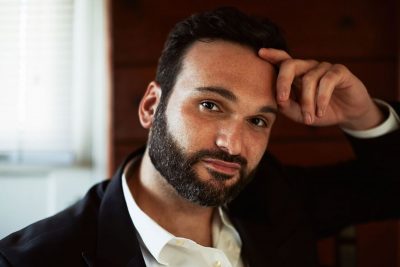
In an increasingly divisive political climate, much of comedy turns to topical humor that appeals to the masses. Many individuals don’t need to look further than a recent episode of “Saturday Night Live” to spot a cheeky jab at a legislator or pundit. At least one comedian, however, doesn’t see the presidency as a punchline.
Nemr Abou Nassar, a Lebanese-American comedian who performs as Nemr, shapes his show around cultivating unity and effecting change, even if certain members of the audience find his views disagreeable.
In an interview with The Daily Free Press, Nemr advocated for the use of comedy as a powerful tool for positivity and unity. His current tour focuses on jokes that everyone, regardless of party affiliation or nation of origin, can laugh at, but he said he isn’t afraid to communicate his political beliefs while on stage.
Nemr said he is steadfast in what he believes in, and explained that he avoids self-contradiction when making political statements and stays away from current events. Some of his jokes involve controversial subjects and figures such as President Donald Trump, but he emphasized that “the joke is actually timeless” and that he uses topical humor to “set the stage for … reflection.”
Regardless, Nemr still sees pushback at some of his shows. Although his views are “of acceptance,” he said he recognizes that not everyone in the audience will be open to what he has to say. The cause of that, he said, is that “other comedians have put them in that position” of an aggressively political show. Moreover, his Middle Eastern origins, he said, have led some audiences to falsely believe that he might express anti-white sentiments.
As a result, he has developed strategies for addressing what he calls a “loaded environment.” If a particular audience member seems to be especially upset, he will put forth an effort to interact with them and “make them feel special,” he said. Adding that “these people are just angry,” he emphasized that he wants to form a connection and have a positive influence on audiences.
“I really genuinely care about that person [who hates me],” Nemr said, noting he hopes that audience interactions can lead to a more open-minded show. “I have radically different views than anybody, anywhere,” he said, adding that he wants viewers to just “give it a chance.”
Those different ideas, as well as a love for the comedy used to communicate them, may stem from a particularly unique upbringing, he said. At the age of two, his family immigrated from Lebanon to San Diego, returning only after the end of the Lebanese Civil War, he said.
In times of political turbulence, Nemr stated that his family found happiness in American stand-up.
“The first happy childhood memory was hearing my parents laughing hysterically and walking into the room and seeing them watching comedy,” he recalled.
From those early moments, he said he knew he wanted to be a comedian. He began to memorize the routines he saw on TV and continued to work on comedy when he returned to the Middle East. It was there that he first found himself on the stage, hosting concerts for large audiences while a student at the American University of Beirut. After that, there was no turning back.
Now, having performed in both the United States and the Middle East, Nemr compared performing on both sides of the world as if they were “two great bottles of wine.”
“You … appreciate them for different reasons,” he said. On performing in the Middle East, Nemr said that it is “very purposeful” because “there’s so much darkness there.” The United States, on the other hand, is “funner,” because he “can focus a bit more on the material.”
Despite differences between the two, a focus on happiness remains central. Whereas in the Middle East, the goal is to bring “ultimate happiness in the worst circumstances,” the goal in the United States is to offer “happiness in the best circumstances.”
He said he likes to give people “one thing to laugh at together,” drawing connections between comedy and unity.
“I want everyone to have a good time together … when they leave,” Nemr said, “they’re going to be close.”
















































































































